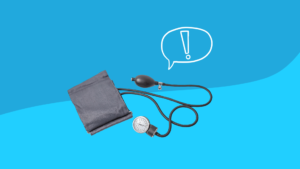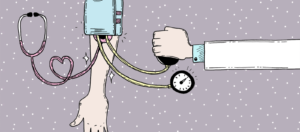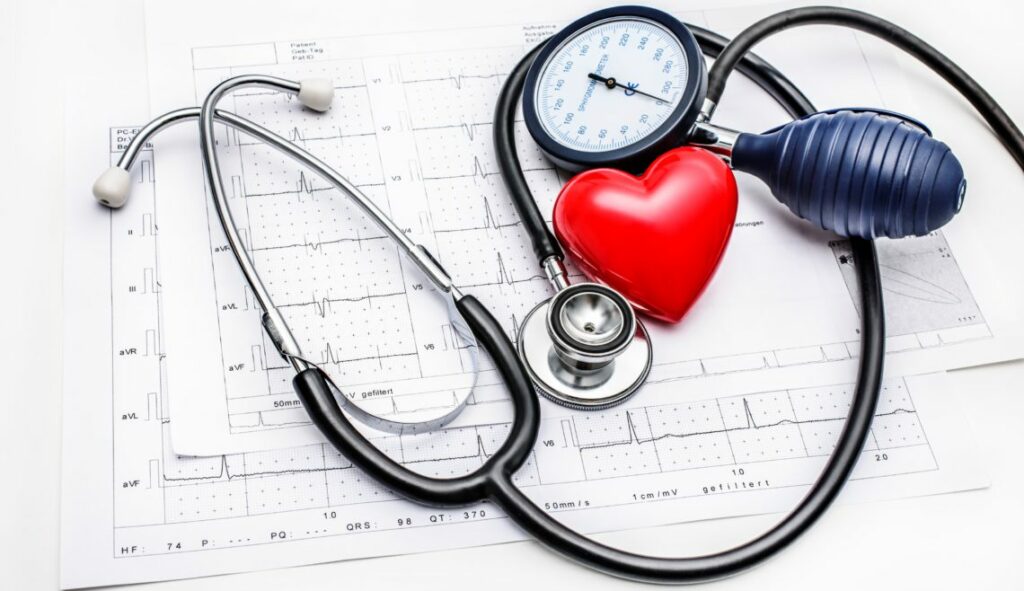Anxiety is a feeling of unease or worry that can be mild or severe. It is a normal stress reaction, but for some people, it can become overwhelming and interfere with daily life. High blood pressure, or hypertension, is a condition in which the blood pressure is chronically elevated. Both anxiety and high blood pressure are common conditions, and they often occur together. In this blog post, we will explore the connection between anxiety and high blood pressure, and we will discuss ways to manage each condition.
Contents
Defining Anxiety
Anxiety is a normal emotion that everyone experiences at some point in their life. It is a feeling of unease or worry that can be mild or severe. For most people, anxiety is a short-lived response to a stressful situation, such as public speaking or taking a test. Once the stressful situation has passed, the anxiety will dissipate. However, for some people, anxiety does not go away and can become overwhelming. When this happens, it is called an anxiety disorder.
Anxiety disorders are the most common mental health disorders in the United States, affecting 40 million adults (18%) each year. Anxiety disorders can cause physical symptoms, such as sweating and a racing heart. They can also interfere with daily activities, such as work, school, and relationships. There are several different types of anxiety disorders, including generalized anxiety disorder, panic disorder, and social anxiety disorder.
Defining Blood Pressure
High blood pressure, or hypertension, is a condition in which the force of the blood against the walls of the arteries is chronically elevated. Blood pressure is measured in two numbers: systolic (the top number) and diastolic (the bottom number). A person with high blood pressure has a systolic reading of 140 or higher and/or a diastolic reading of 90 or higher.
Hypertension is a very common condition, affecting one in three adults in the United States. It is often called the “silent killer” because it usually has no symptoms. However, if left untreated, hypertension can lead to serious health problems, such as heart disease, stroke, and kidney failure.
Anxiety And Blood Pressure

There is a strong connection between anxiety and blood pressure.
- Anxiety can cause an increase in blood pressure, and high blood pressure can cause anxiety. This is because the physical symptoms of anxiety, such as a racing heart and sweating, are also symptoms of high blood pressure. In addition, the stress of living with a chronic condition like hypertension can contribute to anxiety.
- Brain chemicals also play a role in the connection between anxiety and blood pressure. The brain chemicals norepinephrine and epinephrine, which are released during times of stress, can constrict blood vessels and raise blood pressure. In addition, people with anxiety disorders often have an imbalance of brain chemicals, which can further contribute to high blood pressure.
- Oftentimes, people with anxiety may indulge in habits like smoking, consuming alcohol, overeating, or being lethargic. These habits can further increase blood pressure. It is important to manage both anxiety and blood pressure in order to maintain a healthy lifestyle.
- In addition to anxiety, other contributing factors such as age, weight, diet, environment, and stress, among other things, can also result in blood pressure problems.
- Other physical/mental illnesses can also affect blood pressure. These include but are not limited to:
-Dehydration
-Heart disease
-Thyroid problems
Anxiety is a common condition that can have a big impact on our physical health. If you think you may be suffering from anxiety, it’s important to see a doctor. They will be able to properly diagnose and treat the condition. Left untreated, anxiety can lead to serious health problems like high blood pressure, heart disease, stroke, and kidney failure.
Other Physical Health Problems Caused By Anxiety

Anxiety symptoms, in a lot of cases, have a huge influence on our body’s physiology. In addition to fluctuating blood pressure, other physical effects of anxiety include:
- Upset stomach: This can include symptoms like diarrhea, constipation, nausea, and vomiting.
- Muscle tension: This can lead to headaches, jaw pain, back pain, and neck pain.
- Rapid breathing: Also called hyperventilation, this can cause tingling in the hands and feet, lightheadedness, dizziness, and fainting.
- Sweating: Anxiety can cause sweating even when it’s not hot out or you’re not exercising.
- Bodyaches: As mentioned, anxiety can cause muscle tension, which leads to body aches. This can also be due to bodily anxiety reactions like trembling, clenching, tightness, etc.
- Changes in eating habits: Anxiety can cause a loss of appetite or overeating. It can also lead to problems like acid reflux.
- Headaches: Tension headaches are the most common type of headache, and they’re often caused by stress.
- Sleeping problems: Anxiety can cause difficulty falling asleep or staying asleep. It can also lead to insomnia. It can even be a cause of nightmares
- Fatigue: Feeling tired all the time is a common symptom of anxiety. This is because anxiety can cause sleeping problems, which leads to fatigue.
- Chest pain: This can be a symptom of panic attacks, which are episodes of intense fear or anxiety that can come on suddenly and include chest pain. However, it is important to note that chest pain can also be a symptom of other serious health conditions, such as heart attacks.
These physical symptoms can sometimes be so severe that they result in missed days of work, school, or other important activities. In some cases, the effects of anxiety can even lead to hospitalization. If you are experiencing any of these symptoms, it is important to see a doctor as soon as possible. Do not wait until the symptoms become so severe that they interfere with your life.
Treatment Options
Despite the ill effects and problems, both anxiety and blood pressure are manageable issues with available treatments that help in reducing and managing the symptoms.
For Anxiety
Though there is no permanent cure for anxiety, there are many different treatment options available for anxiety. The type of treatment that is right for you will depend on the severity of your symptoms and your preferences. Some people prefer to treat their anxiety with medication, while others prefer to use therapy or a combination of both.
Medication
There are many different types of medication used to treat anxiety disorders, including selective serotonin reuptake inhibitors (SSRIs), benzodiazepines (Xanax, Ativan), and tricyclic antidepressants (TCAs). These medications can be very effective in treating the symptoms of anxiety. However, they can also have some side effects, so it is important to talk to your doctor about whether or not this is the right option for you.
Therapy
Many different types of therapy can be used to treat anxiety. Some of the most effective therapies for dealing with anxiety include:
- Cognitive Behavioral Therapy (CBT)
- Exposure Therapy
Dialectical Behavioral Therapy (DBT)
- Acceptance and Commitment Therapy
- Interpersonal Therapy
- Psychoanalytical Therapy
- Art Therapy
No matter what treatment option you choose, it is important to work with a qualified professional who can help you to develop a treatment plan that is tailored to your specific needs.
Self Help Tips
In addition to professional treatment, there are also many things that you can do on your own to help manage your anxiety.
Practicing relaxation techniques: There are many different relaxation techniques that can be effective in managing anxiety. Some of the most common include deep breathing exercises, progressive muscle relaxation, and meditation.
Journaling: Writing down your thoughts and feelings can help you to better understand your anxiety and identify healthy coping mechanisms.
Getting regular exercise: Exercise can help to reduce the symptoms of anxiety by promoting healthy brain function and improving your mood.
Eating a healthy diet: Eating a healthy diet can also help to reduce the symptoms of anxiety. Be sure to eat plenty of fruits, vegetables, and whole grains. Avoid processed foods, caffeine, and alcohol.
Getting enough sleep: Getting enough sleep is essential for managing anxiety. Be sure to get at least seven to eight hours of sleep each night.
Reducing stress: Reducing stress in your life can also help to reduce the symptoms of anxiety. Try to find healthy ways to cope with stressful situations, such as exercise, relaxation techniques, or talking to a friend.
For Blood Pressure
Since blood pressure is a physiological issue, it is mostly treated with medication in combination to certain lifestyle changes.
Medication
Medicines are the most effective treatment for high blood pressure. Many different types of medication can be used to treat high blood pressure, including:
- Diuretics
- Beta-blockers
- ACE inhibitors
- Angiotensin II receptor blockers
- Calcium channel blockers
- Alpha blockers
- Alpha-2 Receptor Agonists
- Combined alpha and beta-blockers
- Central agonists
- Peripheral adrenergic inhibitors
- Vasodilators
These medications can be very effective in lowering blood pressure. They work by decreasing the amount of work that the heart has to do, dilating blood vessels, or removing excess fluid from the body.
NOTE: It is extremely important to consult your physician for a valid prescription and monitoring the side effects as well as efficacy of the medication on the individual.
Lifestyle Changes
In addition to medication, there are also lifestyle changes that can be made to lower blood pressure. These include eating a healthy diet, reducing salt intake, losing weight, quitting smoking, and exercising regularly. Making these lifestyle changes can be very effective in lowering blood pressure. These include:
- Reducing stress: Stress can make blood pressure worse, so it is important to find ways to reduce stress in your life.
- Exercise: Exercise is a great way to relieve stress and promote relaxation. It can also help to lower blood pressure.
- Diet: Eating a healthy diet is important for overall health and well-being. It can also help to lower blood pressure.
- Quit smoking: Smoking cigarettes is one of the leading causes of high blood pressure. Quitting smoking can help to lower blood pressure.
- Maintaining a healthy weight: Being overweight or obese is a major risk factor for high blood pressure. Losing weight can help to lower blood pressure.
- Limiting alcohol intake: Drinking alcohol can raise blood pressure. Limiting alcohol intake can help to lower blood pressure.
- Reducing salt intake: Too much salt can raise blood pressure. Reducing salt intake can help to lower blood pressure.
Making these lifestyle changes can be difficult, but they are important for lowering blood pressure and reducing the risk of serious health problems. Talk to your doctor about what changes you can make to help lower your blood pressure.
If you have high blood pressure, it is important to work with your doctor to develop a treatment plan that is right for you. With the proper treatment, you can effectively manage your condition and reduce your risk of developing serious health complications.
Conclusion
In conclusion, anxiety and blood pressure are closely related. Anxiety can cause high blood pressure, and high blood pressure can cause anxiety. Treatment for both conditions is important. There are many things that you can do to help manage your anxiety and lower your blood pressure. If you have either of these conditions, it is important to seek professional help. There are many effective treatments available that can help to improve your symptoms and reduce your risk of developing serious health complications. With the proper treatment, you can effectively manage both conditions and improve your quality of life.
For more information, please contact MantraCare. Anxiety is a common mental health condition characterized by persistent feelings of worry, fear, and apprehension. If you have any queries regarding Online Anxiety Counseling experienced therapists at MantraCare can help: Book a trial Anxiety therapy session


